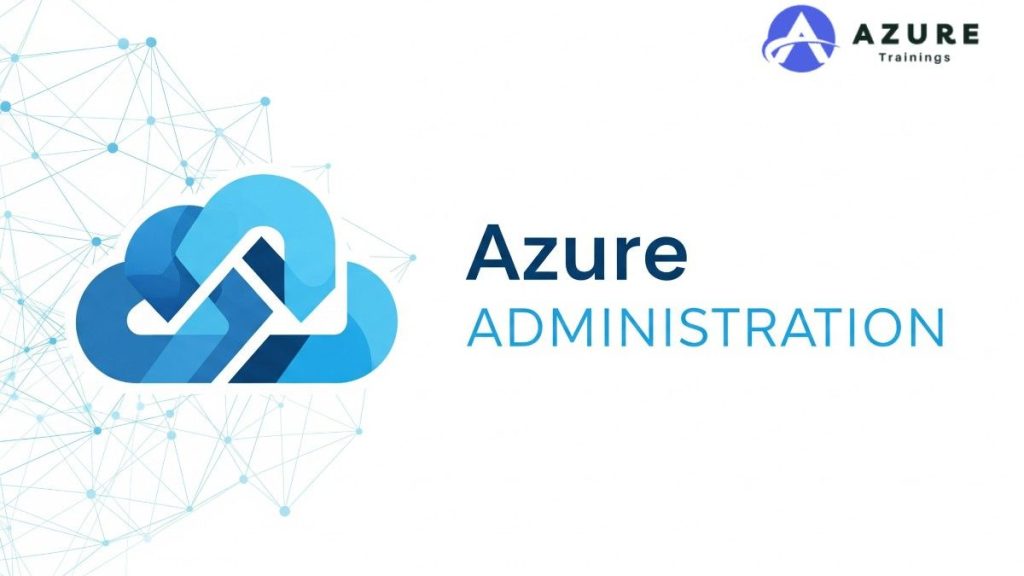How to Become Azure Administrator?
How to Become Azure Administrator?
Azure Administration enables you to manage all aspects of your Azure subscription(s). This includes configuring new resources such as virtual machines (VMs) or Web Apps; setting up networking connections between VMs; managing user access rights; monitoring resource usage; updating system settings such as DNS records for websites hosted in Azure Web Sites

Azure Administrator Skills and Qualifications
You should be familiar with the following technologies:
- Windows Server 2012 R2 and 2019
- Active Directory Domain Services (AD DS)
- SQL Server 2014 and 2016
- System Center Configuration Manager 2012 R2 SP1
- PowerShell 3.0 or later versions
- Windows Azure Pack for Windows Server 2008 R2 SP1 or later versions
- Hyper-V virtualization technology
- Hyper-V isolated host environments (virtual machines)
- Microsoft Azure platform services such as Virtual Machines, Websites, Cloud Services etc
Azure Admin: Digital Business Transformation
In today’s digital era, the importance of Azure administration cannot be overstated. With businesses relying more and more on digital infrastructure, having a robust cloud computing platform like Microsoft Azure is essential for success.
Azure administration involves managing and maintaining the Azure cloud environment, ensuring it is secure, efficient, and optimized to meet business needs.
One of the ways Azure administration is transforming businesses is by providing them with the flexibility they need to scale up or down as required. With Azure, businesses can easily provision additional resources or remove them as needed, without the need for physical infrastructure.
This makes it easier for businesses to respond to changing market conditions, customer demands, and other factors that impact their operations.
Azure administration also offers businesses a range of tools and services to help them manage their data more effectively. Using Azure, businesses can store and process large amounts of data, extract insights from it, and use it to make informed decisions. This can help businesses identify new opportunities, improve their products and services, and optimize their operations.
Finally, Azure administration is critical to ensuring the security of business data and applications. With Azure, businesses can implement a range of security measures, such as firewalls, encryption, and access controls, to protect their data from malicious actors.
They can also monitor their Azure environment in real-time, identify potential security threats, and take action to mitigate them.
Overall Azure administration is essential for businesses looking to succeed in today’s digital era. With its flexibility, data management capabilities, and security features, Azure is helping businesses transform their operations, improve their products and services, and stay ahead of the competition.
Top Azure Administration tools and technologies to master
If you want to become an expert in Azure administration, here are some of the top technologies you should master:
- Azure Resource Manager (ARM): This is a tool for managing Azure resources and creating resource templates. It can help you streamline your deployment process and manage resources in a more efficient way.
- Azure PowerShell: This is a command-line tool that allows you to manage Azure resources using scripts. It is particularly useful for automating tasks and managing large-scale deployments.
- Azure CLI: This is another command-line tool that allows you to manage Azure resources. It is particularly useful for managing resources across multiple subscriptions or tenants.
- Azure Monitor: This is a tool for monitoring the performance and availability of Azure resources. It can help you identify issues before they impact your business operations.
- Azure Security Center: This is a tool for managing the security of Azure resources. It can help you identify and remediate security issues, and ensure compliance with industry standards.
- Azure Backup: This is a tool for backing up and restoring Azure resources. It can help you ensure business continuity in the event of a disaster or data loss.
By learning to use these tools and technologies, you can become an Azure expert who helps your organization realize the full potential of its cloud resources.
Real-world Projects and Assignments in Azure Administration offered by Azuretrainings.in
As a leading provider of Azure Administration training, Azuretrainings.in institute offers a range of real-world projects and assignments to help students develop practical skills and gain hands-on experience.
Here are some examples of the projects and assignments provided by the institute:
- Azure Migration Project: In this project, students are tasked with migrating an on-premises application to Azure. This involves designing and implementing an Azure infrastructure, configuring networking and security settings, and migrating data and applications to the cloud.
- Azure Resource Management Project: In this project, students are tasked with managing a complex set of Azure resources, including virtual machines, storage accounts, and databases. This involves monitoring resource usage, optimizing configurations, and automating resource provisioning and deprovisioning.
- Azure Security and Compliance Project: In this project, students are tasked with implementing security policies, monitoring security events, and performing regular security assessments to identify and mitigate potential risks. This involves using Azure Security Center and other Azure security tools to ensure the security and compliance of Azure resources.
- Azure DevOps Project:In this project, students will learn how to integrate Azure resources with DevOps tools such as Azure DevOps. This involves setting up a source control system, implementing automation scripts, and managing code deployments.
- Azure Disaster Recovery and Business Continuity Project:In this project, students will plan and carry out tasks by implementing and managing Azure disaster recovery and business continuity solutions, such as Azure Site Recovery and Azure Backup. This involves designing a disaster recovery plan, testing the plan, and performing regular backups to ensure business continuity in the event of a disaster.
These projects and assignments provided by Azuretrainings.in institute are designed to help students develop practical Azure Administration skills and gain real-world experience.
By completing these projects, students can build a portfolio of work that demonstrates their proficiency in Azure Administration and helps them stand out in the job market.
Azure Administration mentorship and coaching programs
Azure Administration mentorship and coaching programs help professionals gain the skills, knowledge, and experience they need to succeed in their careers.
These programs offer personalized guidance and support from experienced Azure Administrators, who can provide insights, advice, and feedback on specific areas of focus.
Mentorship and coaching programs involve one-on-one or small group interactions, in which a mentor provides guidance to someone who is trying to develop professionally.
Some programs may be formalized and structured, with specific goals and timelines, while others may be more informal and flexible.
Benefits of Azure Administration mentorship and coaching programs include:
- Individualized Attention: Mentors and coaches can provide personalized guidance and support based on the specific needs and goals of the mentee or student.
- Hands-On Experience: Mentees and students can gain hands-on experience by working on real-world projects and assignments under the guidance of experienced Azure Administrators.
- Networking Opportunities: Mentees and students can expand their professional networks by connecting with other professionals in the field and learning from their experiences.
- Career Development: Mentees and students can develop the skills and knowledge they need to advance in their careers and take on new challenges.
Azure Administration mentorship and coaching programs may cover a range of topics, including Azure infrastructure management, security and compliance, automation and DevOps, and disaster recovery and business continuity. Programs may be offered by Azure training providers, professional organizations, or individual mentors and coaches.
By participating in Azure Administration mentorship and coaching programs, professionals in the field can accelerate their learning and development, gain valuable insights and experience, and achieve their career goals.
Azure Administration specialization areas
- Cloud Infrastructure Management: Azure Administrators are responsible for managing and maintaining the cloud infrastructure, including virtual machines, storage, networking, and security.
- Azure Active Directory: Azure Active Directory (Azure AD) is Microsoft’s cloud-based identity and access management service. Azure Administrators who specialize in Azure AD are responsible for managing user identities, groups, and access to Azure resources.
- DevOps: Azure Administrators who specialize in DevOps are responsible for automating infrastructure management and deployment processes, using tools like Azure DevOps and GitHub.
- Data Management: Azure Administrators who specialize in data management are responsible for managing and optimizing Azure data services, such as Azure SQL Database, Azure Cosmos DB, and Azure Data Factory.
- Security and Compliance: Azure Administrators who specialize in security and compliance are responsible for ensuring the security and compliance of Azure resources, including implementing security policies, configuring firewalls, and monitoring for threats.
- Application Management: Azure Administrators who specialize in application management are responsible for managing and optimizing Azure application services, such as Azure App Service and Azure Functions.
- Internet of Things (IoT): Azure Administrators who specialize in IoT are responsible for managing and securing Azure IoT services, such as Azure IoT Hub and Azure Stream Analytics.
- Artificial Intelligence and Machine Learning: Azure Administrators who specialize in artificial intelligence and machine learning are responsible for managing and optimizing Azure AI and ML services, such as Azure Cognitive Services.
Overall, Azure Administration offers a range of specialization areas, allowing professionals to focus on areas of interest or expertise.
By specializing in a particular area, Azure Administrators can develop advanced skills and knowledge, making them more valuable to employers and increasing their career opportunities.
Azure Administration best practices and guidelines
- Security: Ensure that Azure resources are secured by following best practices for identity and access management, network security, and data protection.
- Cost Optimization: Optimize Azure costs by using tools like Azure Cost Management and optimizing resource usage.
- Resource Management: Use Azure Resource Manager (ARM) templates to manage and deploy Azure resources consistently and efficiently.
- Monitoring and Alerting: Use Azure Monitor to monitor the health and performance of Azure resources and set up alerts to notify administrators of issues or potential problems.
- Automation: Use Azure Automation to automate common administrative tasks and reduce manual workloads.
- Backup and Disaster Recovery: Set up backup and disaster recovery solutions for critical Azure resources to ensure business continuity in the event of a disaster.
- Compliance: Ensure that Azure resources are compliant with regulatory requirements, such as HIPAA and GDPR.
- Documentation: Maintain up-to-date documentation of Azure resources, including configurations, policies, and procedures.
- Testing: Test Azure resources thoroughly before deploying them to production environments to identify and address potential issues.
By following these best practices and guidelines, Azure Administrators can ensure that Azure resources are secure, cost-effective, and well-managed.
Getting Certified
There are a number of ways to get certified in Azure. The most common certification is the Microsoft Certified: Azure Administrator Associate, which can be obtained by passing an exam. If you’re interested in becoming a solutions architect expert, there’s an additional test for that as well.
Another option is to take the training courses offered by AzureTrainings.in that are designed for IT professionals who want to learn about Azure cloud technology. These courses provide hands-on experience with real-world scenarios so that you can apply what you’ve learned when working on your own projects at home or at work!



